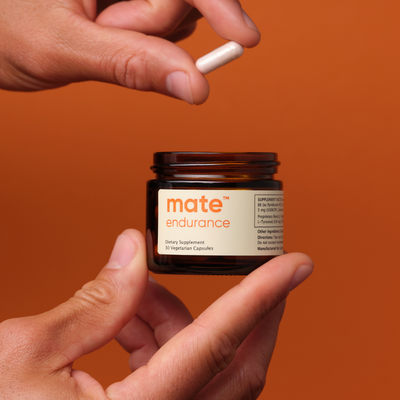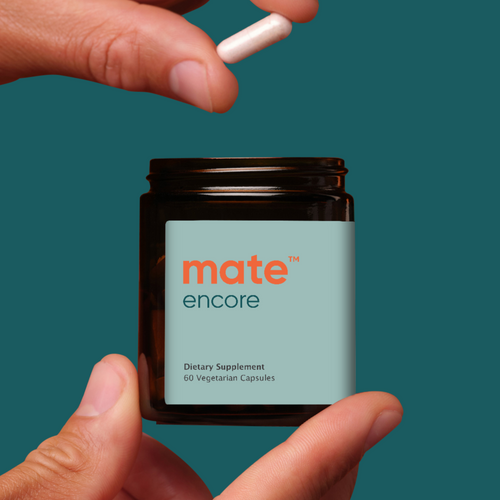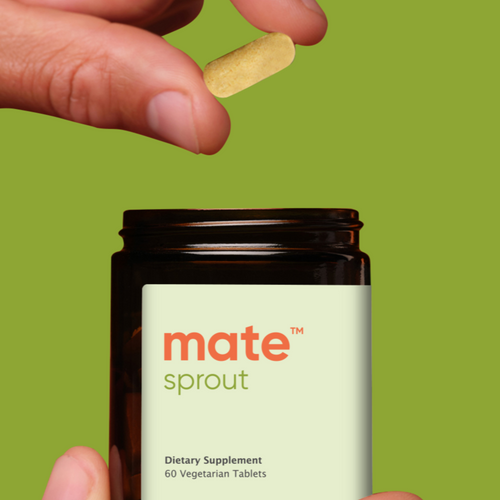Guide to Premature Ejaculation: Definition, Causes & Solutions
Premature ejaculation (“PE” for short) is an issue that impacts nearly 30 - 40% of men, yet only around 10% of men seek out professional advice or treatment. This article is intended to provide men with additional information about premature ejaculation, including statistics, causes, solutions and a self-diagnostic tool, so that they can make more informed decisions about their options.
What Is Premature Ejaculation?
According to the International Society for Sexual Medicine, there are three common factors that suggest an individual may be dealing with premature ejaculation:
- Ejaculation that frequently occurs prior to or within about one minute after vaginal penetration. The time measure that’s often used to describe the amount of time between penetration and ejaculation is intravaginal ejaculation latency time (IELT)
- The inability to delay ejaculation on all or nearly all vaginal penetrations
- A sense of frustration or distress as a result of frequent disappointing sexual encounters, potentially leading to the avoidance of sexual encounters altogether
At its core, premature ejaculation refers to a man’s inability to delay his orgasm and ejaculation, thereby preventing both partners from having a satisfying sexual experience. This often leads to a strong sense of frustration and distress amongst not only the male, but his female partner as well. Gone untreated, premature ejaculation can lead to man’s desire to avoid sexual encounters, or if in a relationship, can lead to strains and annoyance amongst partners.
Lifelong versus Acquired Premature Ejaculation
Premature ejaculation is not a condition that solely affects a certain age group. In fact, individuals may have lifelong PE (or in other words, have it from the first instance of a sexual encounter and continue to suffer from the condition over time), or may acquire the condition at a later age (referred to as acquired PE), with PE symptoms becoming more and more prevalent despite having previously satisfied with sexual performance. As such, premature ejaculation can affect men as early as their first sexual encounter, regardless of age, and men who have been in relationships or a marriage for years.
What Causes Premature Ejaculation?
There are a wide variety of reasons that an individual may be suffering from premature ejaculation. While some are biological and some are environmental, the good news is that much of the time, premature ejaculation can be cured. However, there often isn’t one standard cure for all. For example, while meditation and diet may help one individual address the issue, another individual may find that a natural dietary supplement is their best means of addressing the issue.
Biological Factors
Given that lifelong PE occurs from an individual’s first sexual encounter, there are often biological factors associated with premature ejaculation. These factors could include abnormal hormone levels, elevated levels of neurotransmitters, or inherited traits. These biological factors make lifestyle changes less effective in the treatment of premature ejaculation. As such, an effective natural dietary supplement solution could be the most beneficial when it comes to treating lifelong premature ejaculation.
Stress, Anxiety and Depression
The stress and anxiety associated with premature ejaculation often worsen the problem. By having the issue top of mind during one’s sexual encounter, this further worsens the issue, making it a cycle of stress and anxiety. Additionally, stress and anxiety in other facets of life, from family issues to workplace problems, can often spillover into the bedroom. As such, it is critically important to train the mind to calm itself through meditation and exercise. These activities not only benefit one’s physical wellbeing, but mental wellbeing as well.
Erectile Dysfunction
There is often a high correlation between individuals who suffer from premature ejaculation and those who suffer from premature ejaculation. The stress involved in achieving and maintaining an erection may lead someone to rush towards the moment of orgasm as opposed to taking it slow. This consistent behavior over time can eventually lead to habitual premature ejaculation, as one trains the body to achieve that moment of climax faster and faster.
Fortunately, premature ejaculation, over time, can be controlled, so that you can work towards having longer-lasting sex and delaying your orgasms.
Treatments for Premature Ejaculation
Going about researching articles on the Internet, it seems as though nearly everyone has the answer as to how you can treat premature ejaculation. However, not all the solutions that are presented are indeed effective. Additionally, even of those solutions that are effective and clinically studied, many have negative consequences and side effects associated with them.
The following list is a brief overview of solutions that are often presented to treat premature ejaculation. Each of these solutions, including their benefits and shortcomings, is discussed in greater detail in individual posts.
Communication
This solution may be a tough one for guys who aren’t really in relationships. But for men who are in long-standing relationships with a partner that they trust, communication is really key. Both partners must be upfront about what they’re hoping to get out of the sexual experience. Additionally, when you talk to your partner about your sexual concerns, communicating these sources of stress and anxiety often alleviate that same stress and anxiety going into the sexual encounter, increasing the likelihood of a positive experience.
Stop-Start Technique
The stop-start technique is often portrayed as a method of dealing with premature ejaculation. However, it is better to think of this method as a bandaid as opposed to a solution that gets to the core of the problem. The stop-start method involves beginning your sexual experience, and then stopping right before you sense that you’re about to ejaculate, collecting yourself, and then beginning again. While the stop-start method may add a few more seconds or minutes to your sexual experience, it detracts from the overall pleasure of the experience, as you constantly find yourself stopping pre-climax.
Masturbation Prior to Sex
Like the stop-start technique, this is another band-aid solution as opposed to an effective method of solving the crux of the issue. Additionally, it can often be impractical, as telling your partner that you’ll need a couple minutes of alone time in the bathroom right as you’re about to get it on may be an absolute mood killer.

Nonetheless, masturbation before sex (while not evidence based) can often help men last a bit longer, given that each successive round of stimulation during a defined period of time often takes longer to achieve the point of orgasm. For example, your first round of sex in an evening will usually be much quicker than later rounds. The thinking behind masturbating before sex is that you get that one quick round out of the way, on your own, so that you can last longer during the first sexual encounter of the night.
Topical Sprays and Creams
When it comes to decreasing sexual pleasure, topical sprays and creams may be the most effective at doing just that. While they have been clinically proven to increase endurance in bed, they come with a whole host of negative side effects. In fact, their primary purpose is one of the most evident side effects: the numbing of the penis. While we’re all about dealing with premature ejaculation, it becomes a bit questionable when the solution to do so essentially decreases the pleasure of the sexual experience.
The majority of the sprays and creams on the market today include two predominant local anesthetics, known as lidocaine and prilocaine. By numbing the penis, a man feels less sensation from the sexual experience and is therefore able to last longer. In addition to the numbing of the penis, the numbing agent can also spread over to the partner, leading to decreased sensitivity of the labia, clitoris, and other areas. This numbing of the partner may further delay a man’s ability to have his partner orgasm.
Other shortcomings include the fact that the topical spray or cream must be applied at a certain point before sex (good like timing that), and mis-timing it can result in the loss of erection.
Prescription Drugs
There are no FDA approved prescription drugs for the treatment of premature ejaculation. However, selective serotonin reuptake inhibitors (SSRIs), a subset of depression medications including Zoloft, are often prescribed as a means of dealing with premature ejaculation.
The most common SSRI which is prescribed for the treatment of premature ejaculation is Sertraline, the generic format of Zoloft. The use of prescription antidepressant drugs for the treatment of premature ejaculation come with a wide variety of consequences, including decreased libido / sex drive, increased difficulty in achieving and maintaining an erection, and even suicidal thoughts in young adults.
This again leaves us with the question: at what cost is a premature ejaculation treatment really worth it? If the solution is actually decreasing sex drive, it may be having a negative impact even before it’s able to serve its purpose.
Natural Solutions
Dietary supplements do not fall under the realm of FDA approval. That being said, there are a whole host of natural ingredients, ranging from plants to amino acids to vitamins, that have been suggested to have an impact on an individual’s endurance in bed, without the negative side effects often associated with other solutions. For example, 5-HTP (5-hyrdoxytryptophan) is an amino acid which the body convers into serotonin. This serotonin production in the body reinforces inhibitory pathways from the brain via the serotonin receptors, thereby delaying seminal emission. To counter the effect that increased serotonin production may have on one’s ability to achieve an erection, it’s important to improve blood flow, often done in the body by increasing nitric oxide levels. This can be doing using ingredients such as L-Citrulline. Lastly, ingredients such as tribulus, have been suggested to increase libido and sexual arousal levels. mate endurance is a 100% drug-free natural dietary supplement that contains this essential balance of ingredients.
Practice Mindfulness
Stress and anxiety are often tremendous contributing factors to premature ejaculation. Difficulties in the workplace, fights in a relationship, financial difficulties - all of these elements add an extra layer of stress. Consequently, this stress can lead to difficulties in the bedroom, from being able to obtain an erection to ejaculating earlier than desired. Activities such as meditation, yoga, hikes, walks, jogs, or personal “me” time can all help alleviate this stress and anxiety.
Premature Ejaculation Self-Diagnostic Tool - Index of Premature Ejaculation
Given the difficulty in measuring IELT or applying a quantitative measure to defining premature ejaculation, the Index of Premature Ejaculation (IPE) is currently recognized as one of the best ways to diagnose premature ejaculation.
These questions ask about the effects your sexual problems have had on your sex life over the past four weeks. Spend some time answering these questions thoroughly and honestly to better help you determine whether premature ejaculation is a condition you may need to address.
In answering these questions, the following definitions apply:
- Sexual intercourse is defined as vaginal penetration (you entered your partner)
- Ejaculation is the ejection of semen from the penis
- Control is ejaculating when you are ready
- Distress means how frustrated, disappointed, or bothered you are by your premature ejaculation
1. Over the past 4 weeks, when you had sexual intercourse, how often did you have control over when you ejaculated?
- No sexual intercourse (not applicable)
- Almost always or always
- More than half the time
- About half the time
- Less than half the time
- Almost never or never
- No sexual intercourse (not applicable)
- High confidence
- Moderately high confidence
- Neither high nor low confidence
- Moderately low confidence
- Low confidence
- No sexual intercourse (not applicable)
- Almost always or always
- More than half the time
- About half the time
- Less than half the time
- Almost never or never
- No sexual intercourse (not applicable)
- Very satisfied
- Somewhat satisfied
- Neither satisfied nor dissatisfied
- Somewhat dissatisfied
- Very dissatisfied
- No sexual intercourse (not applicable)
- Very satisfied
- Somewhat satisfied
- Neither satisfied nor dissatisfied
- Somewhat dissatisfied
- Very dissatisfied
- No sexual intercourse (not applicable)
- Very satisfied
- Somewhat satisfied
- Neither satisfied nor dissatisfied
- Somewhat dissatisfied
- Very dissatisfied
- No sexual intercourse (not applicable)
- Very satisfied
- Somewhat satisfied
- Neither satisfied nor dissatisfied
- Somewhat dissatisfied
- Very dissatisfied
- No sexual intercourse (not applicable)
- High pleasure
- Moderate high pleasure
- Neither high nor low pleasure
- Moderately low pleasure
- Low pleasure
- No sexual intercourse (not applicable)
- Extremely distressed
- Very distressed
- Moderately distressed
- Slightly distressed
- Not at all distressed
10. Over the past 4 weeks, how distressed (frustrated) have you been about your control over ejaculation?
- No sexual intercourse (not applicable)
- Extremely distressed
- Very distressed
- Moderately distressed
- Slightly distressed
- Not at all distressed
Interpreting the Results
If your answers to the above questionnaire fell in the second half of the answer options, seeking out a solution for premature ejaculation may help you increase your sexual satisfaction and your endurance in bed. There are behavioral solutions that may help provide temporary relief, such as the start-stop method or masturbating before sex.
There are also commonly-advertised solutions such as topical numbing creams / sprays or SSRIs, but these often come with a whole host of negative side effects. mate endurance is a natural alternative that has the potential to increase one’s sexual satisfaction and endurance in bed, without the negative side effects often associated with other “solutions.”
This article is for informational purposes only and does not constitute medical advice. The information contained herein is not a substitute for and should never be relied upon for professional medical advice. Always talk to your doctor about the risks and benefits of any treatment.















